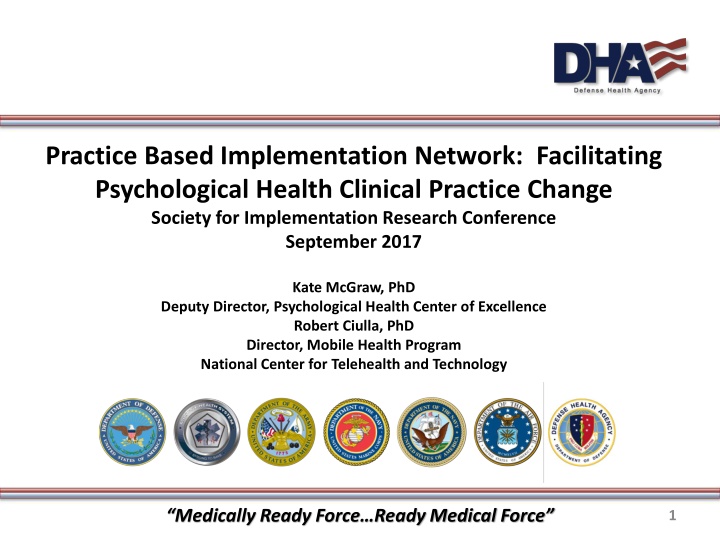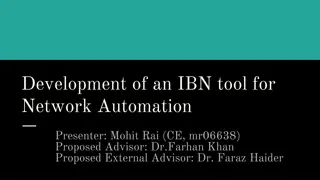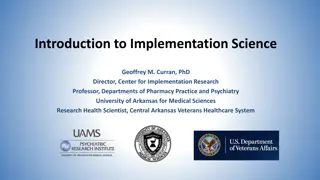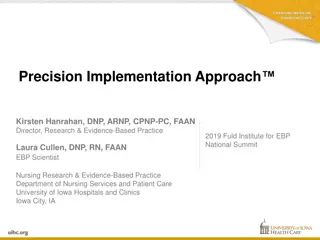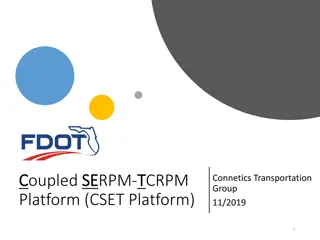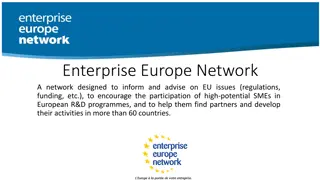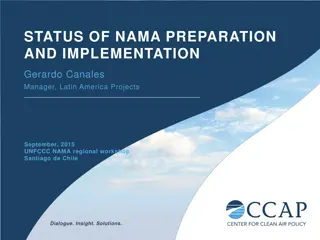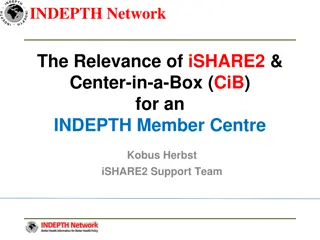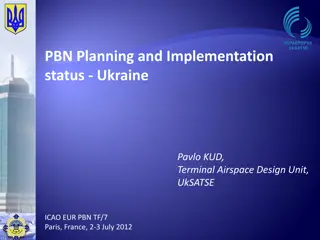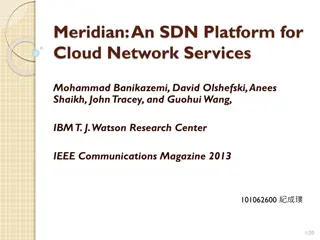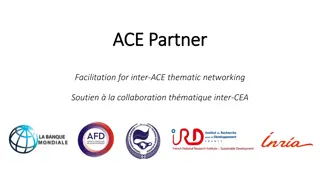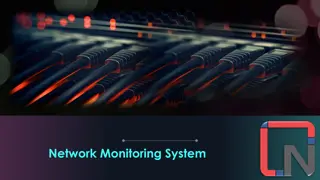Practice Based Implementation Network: Facilitating
This presentation covers the Practice Based Implementation Network and its role in facilitating rapid translation of psychological health research findings into clinical practice. The background, initiatives, and outcomes of the DoD/VA collaborative network are discussed, highlighting the efforts to improve dissemination and implementation of evidence-based treatments across various sites.
Download Presentation

Please find below an Image/Link to download the presentation.
The content on the website is provided AS IS for your information and personal use only. It may not be sold, licensed, or shared on other websites without obtaining consent from the author.If you encounter any issues during the download, it is possible that the publisher has removed the file from their server.
You are allowed to download the files provided on this website for personal or commercial use, subject to the condition that they are used lawfully. All files are the property of their respective owners.
The content on the website is provided AS IS for your information and personal use only. It may not be sold, licensed, or shared on other websites without obtaining consent from the author.
E N D
Presentation Transcript
Practice Based Implementation Network: Facilitating Psychological Health Clinical Practice Change Society for Implementation Research Conference September 2017 Kate McGraw, PhD Deputy Director, Psychological Health Center of Excellence Robert Ciulla, PhD Director, Mobile Health Program National Center for Telehealth and Technology Medically Ready Force Ready Medical Force 1
Disclosure Statement We have no current affiliation or financial arrangement with any grantor or commercial interest that might have direct interest in the subject matter of this program or presentation.
Background According to a 2014 Institute of Medicine report, nearly two decades may pass before psychological health research findings become part of routine clinical practice In 2010, subject matter experts from the Services, DoD and VA began to work together on VA/DoD Integrated Mental Health Strategy (IMHS) Strategic Action # 26, Translation of Research into Practice Group identified need to build a joint VA/DoD structure to facilitate more rapid research translation
Background DoD/VA Joint Incentive Fund grant awarded to pilot the implementation of an enduring collaborative network that would: Improve dissemination, implementation and evaluation of evidence- based treatments Facilitate effective clinical practice changes across the enterprise and between Departments DoD and VA piloted the Practice Based Implementation (PBI) Network from 2013 -2015 to more rapidly translate psychological health research findings into clinical practice by promoting practice change
Background 32 VA/DoD Sites A Virtual Knowledge Sharing Community Resources on MAX.gov and PHCoE Website DoD governance through the Defense Health Agency Mental Health Work Group (MHWG) and sustained through PHCoE
Background: Map of Sites Mt. Vernon Tacoma JBLM Fargo Lakenheath Bedford Boise England Detroit Lebanon Philadelphia Salt Lake City Offut AFB WPAFB Richmond Portsmouth Naval Medical Center Ft. Riley Camp Pendleton San Diego Naval Medical Center Little Rock Columbia San Diego Ft. Benning Luke AFB Tuskegee Ft. Stewart Valley Coastal Bend Alexandria EglinAFB DoDKey VA Tech into Care Sites Section 402 LacklandAFB Schofield Barracks JBPHH 6 Medically Ready Force Ready Medical Force
Background: Web Platforms http://www.pdhealth.mil/research/dodva-pbi-network http://pdhealth.mil/research/dodva-pbi-network
PBI Network Pilot: Implementation Process Goals of pilot: Facilitate outcomes monitoring using Posttraumatic Stress Disorder Checklist to enhance PTSD treatment, and measure sustained provider practice change Construct and sustain a network of at least 20 clinics in VA and DoD Evaluate six month practice change pilot and evaluate pilot PBI Network Method: Site Champions from clinic used to facilitate knowledge acquisition, facilitate practice change adoption, enhance communication Web platform to enhance communication and knowledge exchange Administered surveys to determine baseline practices and attitudes Called site champions twice a month initially; after month three, called monthly Collected and analyzed six month post-facilitation data Interpreted results, provided feedback to clinic leaders and enterprise governance Ongoing implementation science training provided to participants
PBI Network Pilot: DoD Lessons Pilot appeared to have led to positive practice and attitude change towards use of PCL to monitor PTSD treatment Requests for best practices at other sites were shared Ongoing collaboration to reduce implementation barriers were shared Highlighted barriers for outcome measures policy implementation Leadership buy-in and prioritization of outcomes monitoring necessary for practice change General confusion over IT systems and data portals Lack of processes for outcomes monitoring RVU generation and patient access to care issues often interfered with delivery of evidence-based care
Sustainment In November 2016, PHCoE hosted first annual PBI Network Psychological Health Practice Change Prioritization Work Group (PCPWG) to: Systematically review and prioritize submitted DoD research translation implementation proposals, based on transparent knowledge translation readiness criteria and extant evidence base for recommendation to the DHA MHWG Invitees were from DoD, VA, Military Research and Materiel Command (MRMC), Walter Reed Army Institute of Research (WRAIR), National Intrepid Center of Excellence (NICoE), Substance Abuse and Mental Health Services Administration (SAMHSA), National Institutes of Health (NIH), Agency for Healthcare Research and Quality (AHRQ), Center for Deployment Psychology (CDP), and Uniformed Services Health Sciences University (USUHS) Medically Ready Force Ready Medical Force 10
Sustainment PCPWG reviewed three submitted implementation pilot proposals in 2016 and made recommendations for selection to the MHWG; MHWG selected Tech into Care (TiC) for next FY2017 PBI Network pilot Additional PBI Network pilots: Substance Abuse Brief Intervention and Referral for Treatment in primary care behavioral health (completed in 2016); Section 402 VA Legislative Change (ongoing) PCPWG will take place annually; next one in December 2017 Accepting submissions for FY18 implementation pilot proposals starting in October Up to two pilots will be initiated in PBI Network per year Medically Ready Force Ready Medical Force 11
PBI Network FY17 Pilot: Tech into Care (TiC) Technology can be used to support ongoing mental health care, to link care, or to bridge care when care is difficult to access Specifically, mobile applications (apps) are a cost-effective means to support delivery of evidence-based practices DoD and VA have developed a large and growing suite of web and mobile interventions to address mental health concerns, yet clinicians have limited guidance on how to effectively and safely implement these resources Pilot Objective: Develop and conduct an implementation pilot designed to facilitate the use and integration of mobile apps by DoD behavioral health providers into clinical practice Medically Ready Force Ready Medical Force 12
PBI Network FY17 Pilot: Tech into Care (TiC) Site Implementation Planning Training and Facilitation Monitoring and Evaluation Engagement Medically Ready Force Ready Medical Force 13
PBI Network FY17 Pilot: Tech into Care (TiC) Pilot Activities: Engaged the Practice-Based Implementation (PBI) Network to recruit sites for participation in the Tech into Care Pilot; seven sites recruited Designed and executed an implementation and training program to support integration of apps in behavioral health care; 5/7 sites now complete Assessing implementation progress and outcomes (provider self-report and medical record review) in order to refine training and implementation strategies and to enable more widespread dissemination of technology-facilitated care; data collection underway Evaluate barriers and facilitators to enterprise dissemination and advise MHWG; provide feedback to participants Medically Ready Force Ready Medical Force 14
TiC: Implementation Planning Held teleconferences with site champions to inform development of implementation plan, participant training, and supporting materials Selected apps to be used Developed clinical workflow to integrate apps in practice Developed clinical resources for providers (e.g., scripts for introducing apps, etc.) Solicited feedback from site champions and key stakeholders on implementation plan and materials Adapted plan and materials as needed to address individual site clinic differences Medically Ready Force Ready Medical Force 15
TiC: Training and Facilitation Conduct training at each Pilot site The training is scheduled at a time convenient for providers to minimize impact on RVU generation Training curriculum includes: Pilot purpose and background on the use of mobile apps in health care Understanding and using mobile apps Integrating selected mobile apps into clinical care Security and privacy Ethical considerations Documentation and coding Conduct regular facilitation calls and provide implementation support to participants Medically Ready Force Ready Medical Force 16
TiC: Monitoring and Evaluation Monitor metrics to evaluate progress of TiC pilot, to include: Provider knowledge of how to effectively use apps in care Provider attitudes toward using mobile apps in practice and perceptions of usefulness and effectiveness Provider current/prior use of mobile apps in practice Provider experience using mobile apps in practice including social, behavioral, and clinical facilitators and barriers Factors contributing to uptake and adoption of mobile apps in practice Documentation of use of mobile apps in medical record Data collection at pre-training, post-training, 1-month post-training, and 3- months post-training Medically Ready Force Ready Medical Force 17
Points of Contact Kate McGraw, Ph.D., Deputy Director, DHCC kathy.l.mcgraw2.civ@mail.mil Robert Ciulla, Ph.D., Director, Mobile Health Program, T2 robert.p.ciulla.civ@mail.mil
Implementation Science References Burnes, B. (2004). Managing change: A strategic approach to organizational dynamics. Pearson Education. Carroll, C., Patterson, M., Wood, S., Booth, A., Rick, J., & Balain, S. (2007). A conceptual framework for implementation fidelity. Implementation Science, 2(40), 1-9. Chamberlain, P., Brown, C. H., Saldana, L., Reid, J., Wang, W., Marsenich, L., & Bouwman, G. (2008). Engaging and recruiting counties in an experiment on implementing evidence-based practice in California. Administration and Policy in Mental Health and Mental Health Services Research, 35(4), 250-260. Damschroder, L. J., Aron, D. C., Keith, R. E., Kirsh, S. R., Alexander, J. A., & Lowery, J. C. (2009). Fostering implementation of health services research findings into practice: a consolidated framework for advancing implementation science. Implementation Science, 4(1), 50. Department of Veterans Health Administration, Health Services Research & Development, Quality Enhancement Research Initiative. (2013). Implementation Guide. Washington, DC: Health Services Research & Development Service. Retrieved from Department of Veterans Health Administration website: http://www.queri.research.va.gov/implementation/ImplementationGuide.pdf
Implementation Science References Helfrich, C. D., Li, Y. F., Sharp, N. D., & Sales, A. E. (2009). Organizational readiness to change assessment (ORCA): development of an instrument based on the Promoting Action on Research in Health Services (PARIHS) framework. Implementation Science, 4(38), 38. Jackson, G. L., Powell, A. A., Ordin, D. L., Schlosser, J. E., Murawsky, J., Hersh, J., Provenzale, D. & Haggstrom, D. A. (2010). Developing and sustaining quality improvement partnerships in the VA: the Colorectal Cancer Care Collaborative. Journal of general internal medicine, 25(1), 38-43. McHugh, R. K., Barlow, D.H. (2010). The dissemination and implementation of evidence-based psychological treatments: A review of current efforts. American Psychologist, 5(2), 73-84. Ruzek, J. I., Karlin, B. E., & Zeiss, A. (2012). Implementation of evidence-based psychological treatments in the Veterans Health Administration. In R.K. McHugh and D. H. Barlow (Eds.), Dissemination of evidence- based psychological treatments., 78-96. New York, NY: Oxford University Press. Stetler, C. B., Damschroder, L. J., Helfrich, C. D., & Hagedorn, H. J. (2011). A guide for applying a revised version of the PARIHS framework for implementation. Implementation Science, 6(1), 99. Stetler, C., Mittman B., & Francis, J. (2008). Overview of the VA quality enhancement research Initiative (QUERI) and QUERI theme articles: QUERI series. Implementation Science, 3(8), 8-18. Wang, W., Saldana, L., Brown., & Chamberlain, P. (2010). Factors that influenced county system leaders to implement an evidence-based program: a baseline survey within a randomized control trial. Implementation Science, 5(72).
PTSD References Balas, E. A., & Boren, S. A. (2000). Managing clinical knowledge for health care improvement. In J. Bemmel & A. T. McCray (Eds.), Yearbook of medical informatics 2000: Patient-centered systems (pp. 65 70). Stuttgart, Germany: Schattauer Verlagsgesellschaft. Blanchard, E. B., Jones-Alexander, J., Buckley, T. C., & Forneris, C. A. (1996). Psychometric properties of the PTSD Checklist (PCL). Behaviour research and therapy, 34(8), 669-673. Boswell, J. F., Kraus, D. R., Miller, S. D., & Lambert, M. J. (2015). Implementing routine outcome monitoring in clinical practice: Benefits, challenges, and solutions. Psychotherapy research, 25(1), 6-19. Brownson, R. C., Kreuter, M. W., Arrington, B. A., & True, W. R. (2006). Translating scientific discoveries into public health action: how can schools of public health move us forward?. Public Health Reports, 121(1), 97. Burnes, B. (2004). Managing Change: A Strategic Approach to Organizational Dynamics, Financial Times Management. Institute of Medicine. (2014). Treatment for posttraumatic stress disorder in military and veteran populations: Final assessment. Washington, DC: The National Academies Press. Karlin, B. E., Ruzek, J. I., Chard, K. M., Eftekhari, A., Monson, C. M., Hembree, E. A., Resnick, P.A. & Foa, E. B. (2010). Dissemination of evidence based psychological treatments for posttraumatic stress disorder in the Veterans Health Administration. Journal of traumatic stress, 23(6), 663-673.
PTSD References Kilmer, B., Eibner, C., Ringel, J.S., Pacula, R.L. (2011). Invisible wounds, visible savings?: Using microsimulation to estimate the costs and savings associated with providing evidence-based treatment for PTSD and depression to Veterans of Operation Enduring Freedom and Operation Iraqi Freedom. Psychological Trauma: Theory, Research, Practice and Policy, 3(2), 201-211. Management of Post-Traumatic Stress Working Group. (2010). The VA/DoD clinical practice guideline for the management of post-traumatic stress disorder (Version 2.0 2010). Retrieved from Department of Veterans Health Administration website: http://www.healthquality.va.gov/guidelines/MH/ptsd/ Management of Post-traumatic Stress Working Group. (2013). Posttraumatic stress disorder pocket guide: To accompany the 2010 VA/DoD clinical practice guideline for the management of post-traumatic stress. Retrieved from Department of Veterans Health Administration website: http:/www.healthquality.va.gov/guidelines/MH/ptsd/PTSDPocketGuide23May2013v1.pdf Margison, F. R., McGrath, G. R. A. E. M. E., Barkham, M., Clark, J. M., Audin, K., Connell, J., & Evans, C. (2000). Measurement and psychotherapy Evidence-based practice and practice- of Psychiatry, 177(2), 123-130. Meyers, L. L., Strom, T. Q., Leskela, J., Thuras, P., Kehle-Forbes, S. M., & Curry, K. T. (2013). Service utilization following participation in cognitive processing therapy or prolonged exposure therapy for post-traumatic stress disorder. Military medicine, 178(1), 95-99. based evidence. The British Journal
PTSD References Resick, P.A., Monson, C.M, & Chard, K.M. (2008). Cognitive processing therapy: Veteran/Military version.Washington, DC: Department of Veterans Affairs. Resick, P. A., Monson, C. M., & Chard, K. M. (2014). Cognitive processing therapy: Veteran/military version: Therapist s manual. Washington, DC: Department of Veterans Affairs. Rosen, C. S., Chow, H. C., Finney, J. F., Greenbaum, M. A., Moos, R. H., Sheikh, J. I., & Yesavage, J. A. (2004). VA practice patterns and practice guidelines for treating posttraumatic stress disorder. Journal of traumatic stress, 17(3), 213-222. Terhakopian, A., Sinaii, N., Engel, C. C., Schnurr, P. P., & Hoge, C. W. (2008). Estimating Population prevalence of posttraumatic stress disorder: an example using the PTSD checklist. Journal of traumatic stress, 21(3), 290- 300. Tuerk, P.W., Wangelin, B., Dismuke, C.E., Eftekhari, A., Rauch, S.A., Yoder, M., Myrick, H., & Acierno, R. (2013). Health service utilization before and after evidence-based treatment for PTSD. Psychological Services, 10(4), 401. Weathers, F. W., Huska, J. A., & Keane, T. M. (1991). PCL-M for DSM-IV. Boston: National Center for PTSD Behavioral Science Division. Woodson, J. (2013). Military Treatment Facility Mental Health Clinical Outcomes Guidance.Washington, DC: Assistant Secretary of Defense, Health Affairs, Department of Defense. Retrieved from Psychological Health Clinical Center website: http://www.pdhealth.mil/ehc/OASDmemo_dtd09sep13.pdf
